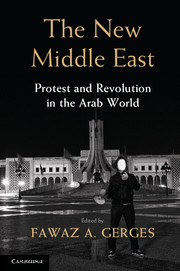Book contents
- Frontmatter
- Contents
- List of Figures and Tables
- Contributors
- Acknowledgments
- 1 Introduction
- Part I Context and Causes
- Part II Thematic and Comparative Aspects
- Part III Countries in Turmoil
- 11 Egypt and Tunisia
- 12 Arab Nationalism, Islamism and the Arab Uprisings
- 13 Yemen
- 14 Libya in Transition
- 15 Bahrain’s Uprising
- Part IV Regional and International Implications
- Selected Bibliography
- Index
- References
11 - Egypt and Tunisia
From the Revolutionary Overthrow of Dictatorships to the Struggle to Establish a New Constitutional Order
Published online by Cambridge University Press: 05 June 2014
- Frontmatter
- Contents
- List of Figures and Tables
- Contributors
- Acknowledgments
- 1 Introduction
- Part I Context and Causes
- Part II Thematic and Comparative Aspects
- Part III Countries in Turmoil
- 11 Egypt and Tunisia
- 12 Arab Nationalism, Islamism and the Arab Uprisings
- 13 Yemen
- 14 Libya in Transition
- 15 Bahrain’s Uprising
- Part IV Regional and International Implications
- Selected Bibliography
- Index
- References
Summary
Abstract
This chapter begins with an account for the presence of a revolutionary situation that needed only a ‘spark’ to ignite it in Tunisia and Egypt. It then goes on to examine the post-revolutionary timetable of elections in these two countries leading to the establishment of a constitutional assembly obligated to create an entirely new structure for the practice of a representative and plural politics. It underlines not only the somewhat different paths taken in Egypt and Tunisia as they progress towards the same general goal, but also the passage of lessons and political experience of both, including what appear to be obvious mistakes. While the Arab world in general made use of examples taken from a global and historical repertoire of revolutionary change going back to the influence of both the American and French revolutions of the late eighteenth century, the mutual influences exercised in the Egyptian-Tunisian case remains something extra special in their intensity and effect.
- Type
- Chapter
- Information
- The New Middle EastProtest and Revolution in the Arab World, pp. 257 - 272Publisher: Cambridge University PressPrint publication year: 2013

